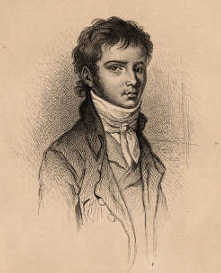![]()
AGE 23 - 24 [1794]
Compiled by Gary D. Evans
|
Last Updated:
March 25, 2019 6:57 PM
|
 |
|
WORKS CREATED
| op 1: 3 Piano Trios for piano, violin & cello #1 in Eb, #2 in G, #3 in c | Haydn criticized this work; Beethoven disagreed. B. felt that #???? was the best of the group. Played at Lichnowsky's early 1794 (?late 1793) and published Summer 1795 by subscription, selling 241 copies at 1 ducat/copy (total income: 241 ducats = 241 x 3.5 fl/ducat = 843 fl). |
| op 2: 3 Piano Sonatas. #1 in f, #2 in A, #3 in C | #1: 1790-94, #2 and 3 in 1794. Pub. 3/96. Dedicated to Haydn |
| op 3: String Trio | (begun in the summer per Ira Brilliant Exhibit 1997) |
| op 19 Second Piano Concerto | Again revised (? with new slow movement and finale) |
| WoO 116: Song, "Ques le temps me dure" | (early 1794) |
| WoO 118: Song,"Seufzer eines ungeliebten; Gegenliebe" | (Melody later used in Choral fantasy and Ode to Joy in 9th symphony) |
| WoO 199: Song, "O care selve" | |
| WoO 126: Song, "Opferlied" | (1794-? 5) (rev. 1801-2) |
| WoO 131: Song, "Erlkonis" | (unfinished) |
| Hess 29: Prelude & Fugue in e for 2 violins & 1 cello | (1794-5) |
| Hess 30: Prelude & Fugue in F & C for 2 violins, 1 cello & 1 viola | (1794-5) |
| Hess 146: | Der freie Mann, earlier version |
BIOGRAPHICAL NOTES
|
DATE
|
|
|
|
Early Viennese period without choral music and very little (1 exception) stage music. Many variations. Rapid publications. Technique of increasing structural compression to drive the music forward w/ nervous intensity. |
|
Jan 1
|
Diary entry "Courage! In spite of all bodily weaknesses my spirit shall rule...This year must determine the complete man. Nothing must remain undone." |
|
Jan
|
Elector visited Vienna |
|
Jan 19
|
Haydn left for 2nd London concert tour, again invited by Salomon (1st tour 1790) - arriving Feb 4th & remaining 19mo until August 1795. With his departure, B. began studies w/ theorist, Albrechtsberger 3x /wk (best known counterpoint teacher in Vienna & Kapellmeister at St. Stephens) while continued study w/ composer Johann Schenk. |
|
?
|
Singer Magdalena Willman arrived in Vienna from Bonn. (Beethoven proposed marriage w/o courtship or encouragement and was refused the next year.) |
|
?
|
French forces occupied Rhinland resulting in broken ties w/ & support from the Bonn court. Electorate of Cologne was essentially closed and the elector was no longer resident in Bonn. |
|
March
|
Beethoven's Bonn salary (Elector Max Franz) ended. |
|
March
|
Lorenz von Breuning arrived for 3 year stay; became close friend during that time. |
|
Mid year
|
B. wrote to Eleonore von Breuning: wanting to embarrass & revenge himself on enemy Viennese pianists. |
|
May
|
Brother Casper Carl moved to Vienna & took job as music teacher briefly then gov't bank cashier at salary ~ 250 G./yr. until his death in 1815. |
|
June
|
Received beautiful scarf from Eleonore von Breuning (see November 1793) and wrote back to her (Anderson#9) of his gratitude & loving friendship. Sent her copy of Rondo in G (WoO 41) |
|
June 18
|
Wrote to Nikolaus Simrock in Bonn (Anderson#10) gently chanstizing him for engraving Beethoven's variations for four hands without his permission. |
|
June
|
Wrote to Johann Schenk (Anderson#11) that Beethoven was leaving for Eisenstadt that day, thanking him for his kindnesses. |
|
Summer
|
Moved from ground floor at Lichnowsky's to 1st floor as guest of house [family area] - lived there through May 1795 (~12mo). Performances occurred Friday mornings w/ salaried musicians Schuppanzigh, Weiss, etc. and amateur Zmeskall. |
|
Aug 2
|
Wrote to Simrock (Anderson#12) about publishing details;mentions current Vienna conditions: "Here they have been arresting several persons of importance; they say that a revolution was about to break out - but I believe that as long as the Austrians have brown beer and sausages, they'll never revolt. They say the gates to the suburbs are to be locked at ten o'clock each night. The soldiers keep their arms well loaded. One must not talk too loudly, or the Police give him lodgings for the night." |
|
Aug
|
Waldstein Variations (WoO67) published |
|
Oct
|
29yo physician and close friend from Bonn, Franz Wegeler, arrived in Vienna along w/ 17yo Lenz von Breuning (who had just earned his MD). Wegeler decided to leave Bonn for Vienna after having been labeled as enemy of the Republic in the Bonn press because of his signing a decree written by the academic senate of the Univ. of Bonn where he acted as Rector of the University. The decree was intended to stop the spread of a febrile disease by forbidding students to visit French troops captured and held in various towns for transport to Austria. Any donations for them were to be brought only by designated clergymen - again, to limit spread of the disease. Both Wegener and Lenz immediately reestablished their close friendships with B. Lenz subsequently returned to Bonn where he died 4 years later at the age of 21yrs. Wegener returned to Bonn 2 years later, June 1796 with ongoing correspondence with B. thru the rest of his life. |
|
?
|
Wrote to the young musician Franz Clement (Anderson#13), encouraging his continued study "Nature and art vie in making you one of the greatest artists." |
![]()